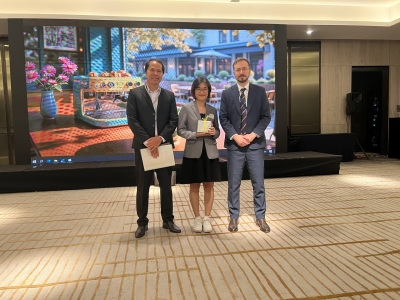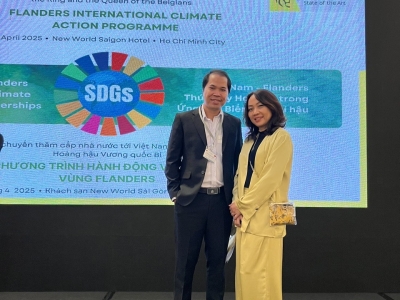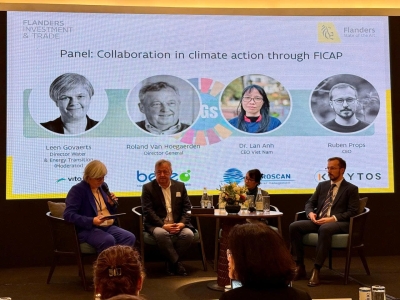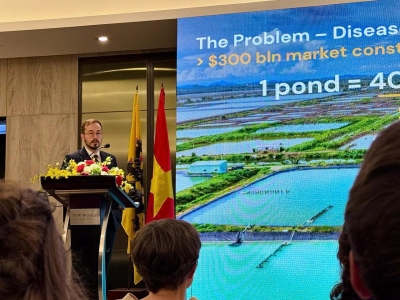FICAP Seminar during the Belgian State Visit to Vietnam 2025


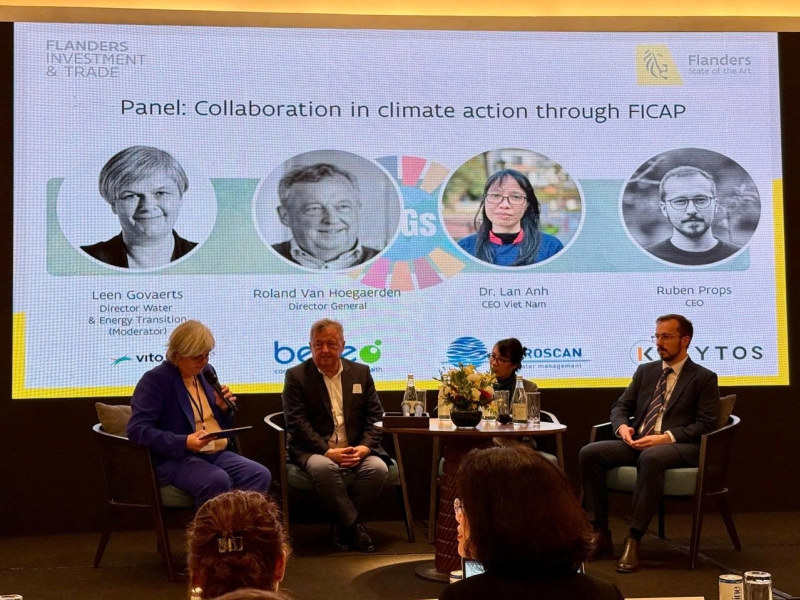
FICAP Seminar in Vietnam highlights shared climate ambitions and innovation
On 3 April 2025, a high-level seminar took place in Ho Chi Minh City as part of the Flemish International Climate Action Programme (FICAP), aiming to strengthen climate cooperation between Flanders and Vietnam. The event was organised by Flanders Investment & Trade (FIT) and the Vietnamese Institute of Meteorology, Hydrology and Climate Change (IMHEN), and coincided with the Belgian state visit to Vietnam. With climate finance and international collaboration high on the agenda, the seminar emphasised the shared commitment to sustainable development, investment in impactful projects, and long-term cooperation between the two regions.
This shared ambition was clearly reflected throughout the seminar, which brought together around 80 Flemish and Vietnamese policymakers, companies, and researchers. The event highlighted how technical expertise from Flanders and local know-how in Vietnam complement each other in tackling climate challenges. In an open and constructive atmosphere, partners from three climate-related projects supported by FICAP shared lessons learned, success stories, and fresh ideas — a strong signal that international co-creation makes a real difference on the path towards a low-carbon, climate-resilient future.
Climate challenges, innovation landscape, and partnerships
Flemish Minister Cieltje Van Achter reminded the audience that climate change is no longer a distant threat but a daily reality that requires joint action. Piet Demunter, Acting CEO of FIT, introduced the FICAP programme. He emphasised that public-private collaboration is a cornerstone of the initiative and that pilot projects play a vital role in both integrating new technologies and building sustainable partnerships between governments and businesses. From a Vietnamese perspective, Prof. Dr. Pham Thi Thanh Nga, Director of IMHEN, presented harsh yet truthful statistics on sea level rise and potential GDP losses of 3 to 5% by 2050. She stressed the importance of international partnerships and access to technology to achieve net-zero emissions by 2050.
Project pitches & dialogue: Flemish technology in a Vietnamese context
Under the moderation of Dr. Leen Govaerts (VITO), a dynamic discussion unfolded on further collaboration between Flanders and Vietnam, through the presentation of three concrete FICAP projects:
- BENEO-Remy, Rikolto and CarbonFarm Technology are rolling out a Sustainable Rice Platform (SRP) model in the Mekong Delta, leading to 30% fewer greenhouse gas emissions and higher farmer incomes.
- HydroScan is developing a real-time flood forecasting and early warning system for Central Vietnam, including training for local authorities.
- KYTOS introduces an AI-driven microbiome toolbox that allows shrimp farmers to cultivate without water exchange, reducing disease outbreaks and climate-related impacts. The Flemish startup works closely together with the Vietnamese Can Tho University for this project.
Following the project presentations, a lively debate took place with the audience on scaling up, financing, and the need for knowledge sharing.
“Consumers are increasingly expecting ingredients from sustainable sources. By applying the SRP standard in rice cultivation, we can reduce emissions by up to 30% while improving farmers' incomes. Thanks to Rikolto’s long-standing collaboration with Vietnamese farmers, we can build the trust needed to make this transition successful.”
- Roland Vanhoegaerden, Operations Managing Director at BENEO-Remy
From promise to impact: what lies ahead?
The key takeaway was clear: Flemish-Vietnamese partnerships are delivering tangible climate results and are forming a solid foundation for future initiatives. With tested models for sustainable rice production, smart water management, and climate-resilient aquaculture, both regions are deepening their collaboration. Many participants said they felt inspired by the ideas exchanged and new connections made, and expressed enthusiasm for setting up new joint initiatives.
Ruben Props, CEO of KYTOS, reflected positively on his participation: “It was undoubtedly a very positive experience. The event led to new applications and collaborations beyond our existing FICAP activities (such as in rice production), and significantly increased the visibility of our start-up with a targeted audience of Flemish and Vietnamese governments and universities.”
